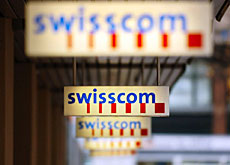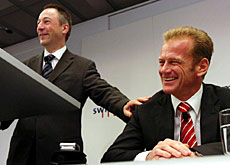
New Swisscom strategy toes government line

Swisscom's three-year strategy heeds government warnings about risking public money but lacks innovation, a telecommunications expert tells swissinfo.
Switzerland’s largest telecommunications firm intends to consolidate its core business, expand into healthcare and banking and exploit underdeveloped markets in emerging European economies.
Professor Matthias Finger of the Federal Institute of Technology in Lausanne believes all three pillars of the plan are logical steps, but he warned that it concentrates too much on services at the expense of technological cutting edge.
“This appears to be the strategy of a company who cannot do much else,” Finger told swissinfo. “What is missing is detail about the development of new technologies and infrastructure.
“I cannot see from this strategy if they are going to be a technological leader, which is where Swisscom have excelled in the past.”
The new strategy was unveiled by recently appointed chief executive Carsten Schloter in Zurich on Wednesday as Swisscom announced increased profit but falling sales in 2005. The company also predicted revenues to fall even further this year.
In January Schloter replaced Jens Alder, who left after the government, which holds a 62 per cent stake in Swisscom, torpedoed his strategy of expansion through acquisitions.
The government has imposed a ban on Swisscom buying foreign fixed-line operators until it sells its majority stake and privatises the company.
By doing so, it sent a clear message that Swisscom is not to take the same kind of risks that caused the collapse of national airline Swissair in 2001.
Safety first
Swisscom plans to bundle its core telecommunications, IT, media and entertainment services into an integrated customer-friendly package, expand its range of business services and tap into European markets which have limited infrastructure.
Finger believes this represents a safety first approach that will be endorsed by the government.
“This is a reflection of where the industry is moving – everybody wants to move into these areas. There is a lot of competition and the margins are not very high,” he said.
“Moving into emerging markets is totally logical considering the strategic objectives of the government. That is how you can grow internationally in harmony with what the government wants.”
But Schloter denied government restrictions on acquiring foreign firms is holding Swisscom back.
“A single acquisition does not necessarily create shareholder value,” he told swissinfo. “When you make an acquisition it only means money changing hands. To create value you must invest or achieve organic growth.
“What we present here is a strategy that clearly states that future business must be different from its existing business if you want to generate value for your shareholders.”
swissinfo, Matthew Allen in Zurich
Swisscom is the dominant player in the Swiss telecommunications market.
It had a monopoly of the market until 1998.
The government announced on November 23 that it wanted to sell its majority stake. The following day it banned Swisscom from buying foreign companies, pulling the rug out from under a proposed takeover of Ireland’s Eircom.
But it later clarified its ban on foreign acquisitions, saying it only related to fixed-line operators.
Financial year 2005
Revenue: SFr9.732 billion (-3.2% compared with 2004)
Ebitda: SFr4.171 billion (-4.9%)
Net profit: SFr2.022 billion (+26.7%)
Proposed dividend: SFr16 (SFr14)
Mobile customers: 4.28 million (+9.5%)
Employees at the end of 2005: 16,088 (+4%)

In compliance with the JTI standards
More: SWI swissinfo.ch certified by the Journalism Trust Initiative







































You can find an overview of ongoing debates with our journalists here . Please join us!
If you want to start a conversation about a topic raised in this article or want to report factual errors, email us at english@swissinfo.ch.